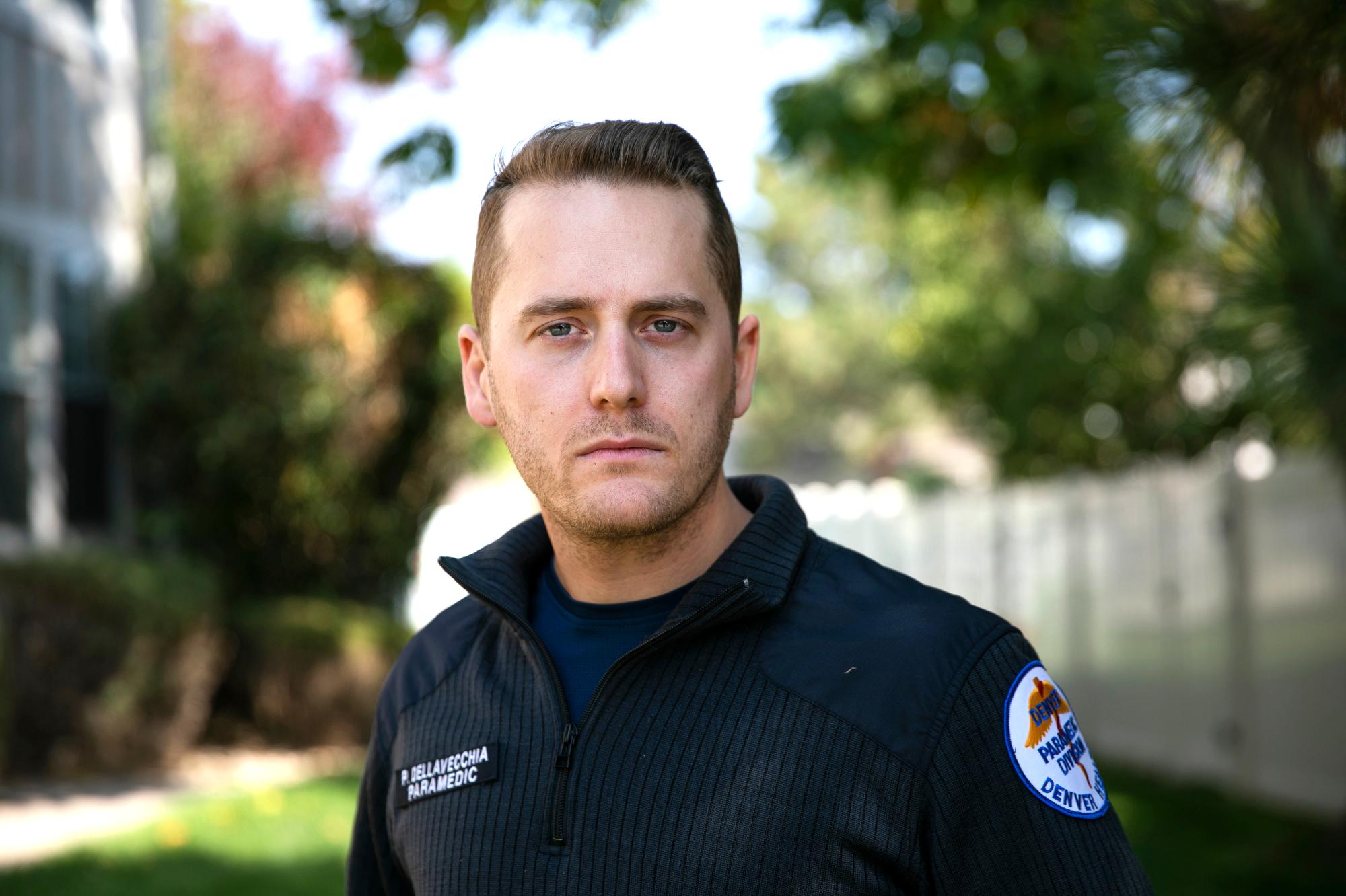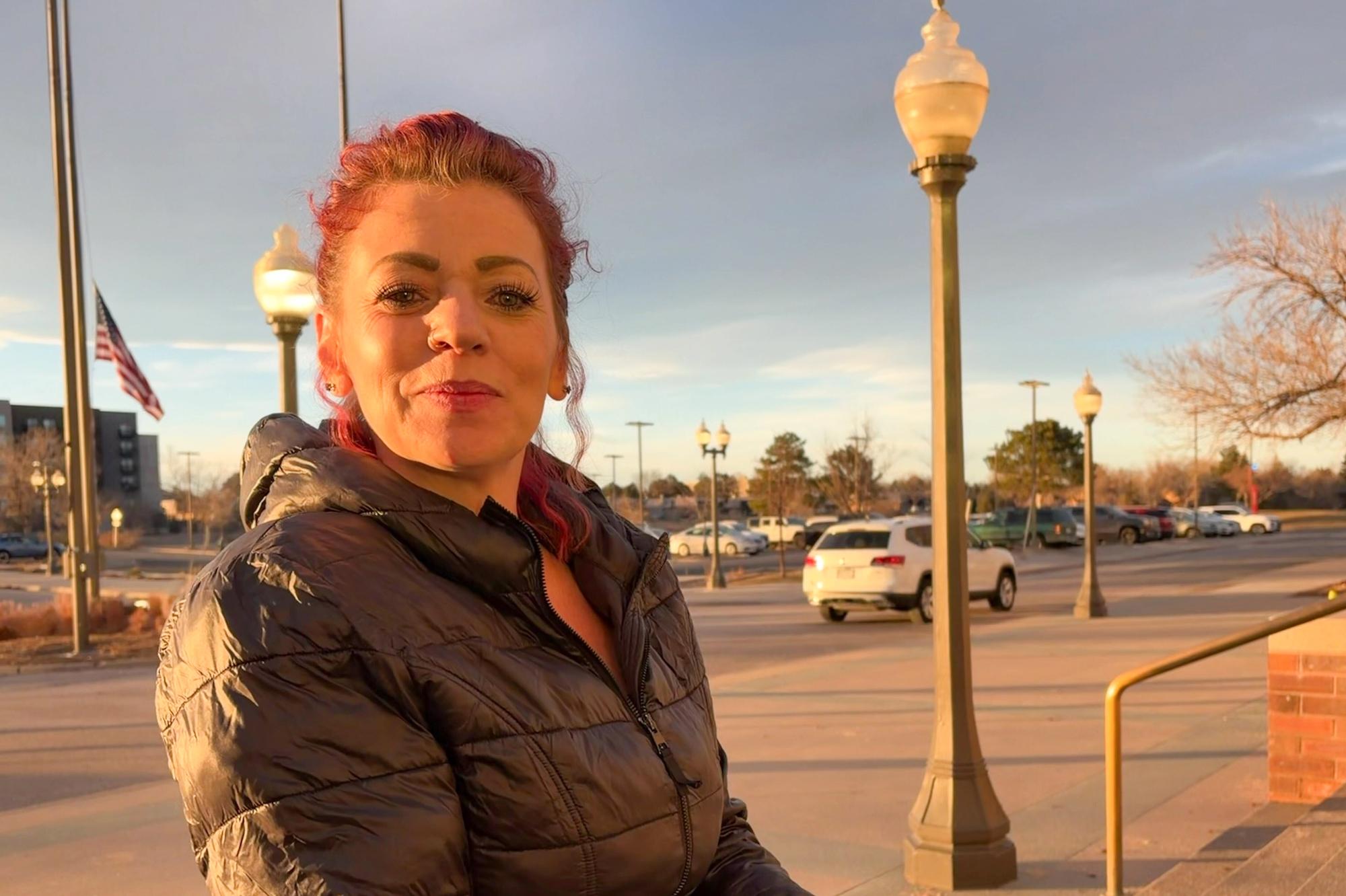
Julie Netzky, an intensive care unit nurse in Denver, can’t get away from work, even when she’s off duty.
When she was at the post office recently, she asked a man who didn’t have a mask to put one on. He got belligerent and flipped her off. Netzky decided she’d wait until he left to go in.
She told another customer: "Listen, I'm an ICU nurse. I take care of COVID patients. I've had COVID, this is really a sensitive thing for me. I can't be in that room."
“And I got back into my car afterwards and I just started bawling.”
Netzky said she and her colleagues put their lives on the line every shift at work, and it hurts “that there are people who are actively engaging in behavior that will spread this virus. And I see what that end game looks like.”
The pandemic has handed frontline providers situations they’d never dealt with before. Colorado’s coronavirus hospitalizations are climbing again to their highest levels since July, putting pressure on already-stressed health care workers.
On Oct. 7, there were 244 confirmed COVID-19 hospitalizations in the state. That’s up nearly 100, more than 65 percent, from a month ago. Gov. Jared Polis called the rise “alarming” at a recent news conference. He said the state was at a “critical juncture,” and needed to reverse the trend “to avoid overwhelming our hospitals.”
The website CovidExitStrategy.org listed Colorado in the first full week of October as “trending poorly” based on the number of cases over the last 14 days.
There’s “uncontrolled spread” of the virus in 23 states, including Colorado’s neighbors Utah, Wyoming, Nebraska, Kansas and Oklahoma. The site reported on Oct. 8 that Colorado has 103 new cases per million. For comparison, Utah had 330 new cases per million. Only two states — Maine and Vermont — were rated “trending better.”
Health care workers are overwhelmed, and it's hurting their mental health
Netzky works in the COVID-19 ward at Denver Health. She recalls a conversation with the wife of one dying patient. She couldn’t say goodbye to her husband in person. Netzky had to explain that all the treatment options for the man had been exhausted.
“One of the heartbreaking things is talking to these families who can’t be there,” she said. “And you are literally the deliverer of hope, if there is any, and feeling like so much weighs on that conversation that you’re having with that person.”
Some of Netzky’s co-workers have dropped down to part-time, and she worries others might leave the field. Often, there’s a lot to process, like a patient she’s gotten to know going rapidly from stable to super sick — needing a ventilator and becoming unresponsive.
“Losing that human part of them, like the personality, the soul of the person, you're just not interacting with that anymore,” Netzky said. “You're treating their body. That's a hard transition to witness.”
All that pressure has hit health care workers, who were already pushed to their limit, hard. Reports have long documented the danger of chronic mental health troubles and PTSD for health workers. The virus worsened it across the board, said Dr. Anuj Mehta, a pulmonologist with National Jewish Health, who also works in Denver Health’s ICU.
“Burnout amongst health care workers, especially in the ICU pre-pandemic was at epidemic proportions already,” he said. “And it's only worse now. It's going to be a reckoning that we all have to face.”
And Mehta noted it hits workers all over the health system.
Consider EMS teams, who probably have as close a view as anyone to the pandemic and its broader societal effects. Since the pandemic hit, paramedic Peter DellaVecchia said the work is “multiple levels of intensity higher than the normal baseline.”
Shootings, stabbings, and overdoses are up sharply in Denver. DellaVecchia has seen more events where a patient loses control and attempts at de-escalation by paramedics fails, requiring help from police.
He recalled one recent case: His Denver Health crew went to check on a man asleep in a parking lot and he got attacked.
“And we’re like trying to tell him, ‘We’re just the paramedics, we’re trying to help you,’ and [he’s] like throwing elbows, throwing punches,” DellaVecchia said. “I was able to hold him down. I was fighting off chokeholds, he was spitting in my eyes.”
The moment stuck with DellaVecchia.
“I think that just kind of highlights the agitation and anger level that people have that they’re just going to fight paramedics, right? People are just at the end of their ropes,” he said. “With the pandemic, the best way I describe it is it’s like trekking through the destruction of the middle class.”
How the caretakers are taking care of themselves, or trying to
To cope, DellaVecchia runs, hikes and meditates. Netzky said she’s started running for stress relief.
“Sometimes I call my runs ‘rage runs’ and those are the ones where I have my fastest times. Those are for when I had a particularly hard shift or issue in my life,” she said. “I always feel better after those. I just try to do good things for myself as often as possible.”
Dr. Robert Lam, an ER doc with UCHealth in Colorado Springs, said that more medical workers should consider using things like exercise and therapy to cope.
“I think it's a cultural challenge. In the profession of medicine it's always kind of like, ‘Put your patients first,’ and then we tend to neglect self-care,” Lam said. “There is this culture that says that asking for help is a sign of weakness.”
In April, the University of Colorado School of Medicine and Department of Psychiatry launched a state-wide program to bring mental health support to frontline health care workers. It’s called Past the Pandemic. The program provides free mental health services. That includes support groups, individual support and an eight-session program on building resilience.
It’s paid for through federal grants secured by the state of Colorado.
Other health systems have developed similar programs.
With his team, Lam urges providers to have a personal crisis plan, a roadmap with warning signs and solutions, and colleagues they regularly check in with.
“So I like to think of what we’ve done as mental health PPE,” he said.
Suicide remains a 'silent epidemic' among doctors, first responders and other health care workers
Lam organized a team run last month of 400 miles, which he said represented a mile for each U.S. doctor lost to suicide last year. He called the trend a “silent epidemic.”
About 300-400 doctors kill themselves each year, a rate more than double the general population, according to one review of literature on the subject.
Another study found nurses too are at a higher suicide risk than the general population. Other research shows that first responders — like EMS providers, police officers and firefighters — face a similarly heightened risk.
If you need help, dial 988 to reach the Suicide and Crisis Lifeline. You can also reach the Colorado Crisis Services hotline at 1-844-493-8255 or text “TALK” to 38255 to speak with a trained counselor or professional. Counselors are also available at walk-in locations or online to chat.
Lam said he was aware of a pair of paramedics in the community who died by suicide in the past couple of months.
Medical workers suffered “soaring” rates of anxiety, depression, and insomnia, according to studies cited in a recent report in the New York Times.
A story earlier this year spotlighted the elevated mental health risks for providers. A top emergency room physician, Dr. Lorna Breen, worked at a New York City hospital that treated many coronavirus patients. She died by suicide in April. Her father, also a doctor, said she had described the devastating toll COVID-19 took on patients.
“She tried to do her job, and it killed her,” he told the New York Times.
One large national survey, the Medscape National Physician Burnout & Suicide Report 2020, found 42 percent of doctors reported they’re burned out. The poll came out in January before the pandemic started. Specialties listed at the top for self-reported burnout included some of the most stressful, and ones now treating a lot of COVID-19 patients seeing a lot of COVID-19 cases. The list includes “critical care, emergency medicine, family medicine, internal medicine, neurology and urology.”
The survey site described burnout as “long-term, unresolvable job-related stress that leads to exhaustion, cynicism, feelings of detachment from one’s job responsibility and a lack of a sense of personal accomplishment.”
One author and expert, Dr. Frank John Ninivaggi, a doctor at Yale New Haven Hospital, described “administrative burden” as a leading cause. Long hours, heavy workload and a lack of support were also cited.
Lam said since the pandemic hit, his hospital has encouraged patients who survived COVID-19 to share their stories with those who helped save them.
“So when you walk in to, before you work your shift, some of those entrance points, they've done a really good job of posting all those wonderful pictures, all those letters [from survivors of COVID-19], trying to put that in front of the health care teams as they're going to start their job,” he said. “I think that does matter. I think that makes a big difference.”
Lam said he got motivated to take proactive steps to help his colleagues after a fellow doctor took her own life. It happened early in his career when he was working in Australia.
“I wonder if, as her supervising physician, could I have done more?” Lam asked. “I think I could have done more for her as a colleague. Some of the biggest risk factors for suicide include means, so every physician knows how to die by suicide. And in some ways, they've conquered death because they see that all the time.”
He wished he’d been more aware of her struggles and told her, “I'm here to help.”
“I still carry [her] with me,” Lam said. “That's why I'm pretty passionate about mental wellbeing and wellness and being an advocate for wellbeing for my colleagues.”
The ongoing pandemic just underscores the importance of healthcare works and first responders getting mental health support now, DellaVecchia said.
“If there is a surge, there will be more burnout. There will be more turnover,” he said. “All essential workers will suffer and all people will continue to suffer — from health concerns to economic hardships.”
The Past the Pandemic program offers The Well-Being Support Line to faculty, clinicians and staff. It’s run by volunteers — mostly students and staff — with back up support from licensed mental health providers. It can also line up referrals for longer-term treatment upon request. The support line can be reached at 303-724-2500.
The Physician-to-Physician Support Line is for medical doctors and medical personnel with PhDs who want to talk to someone familiar with the issues physicians face. It can be reached at is 303-724-1636.









